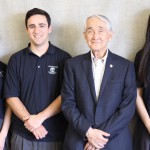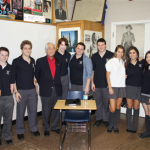On the morning of August 6, 1945, the American B-29 bomber Enola Gay dropped an atomic bomb on the Japanese city of Hiroshima. This would mark the beginning of the final days of the war, ultimately leading to an unconditional Japanese surrender and VJ Day. The hibakusha are the surviving victims of the atomic bombs which fell on Hiroshima and Nagasaki, and Joe Ohori was one of them. He was born in 1931 in Vancouver, British Columbia. In 1940 – when he was nine – Joe’s parents sent him to Japan, to see the family’s ancestral home in the Hiroshima area. He was with his older sister at first, but when she left he was adopted by a family in Hiroshima. On August 6, Joe started the day by waking up early to catch a train to his school. Chance let him survive that day, though he did witness the post-atomic devastation. He was later able to go back to Canada with his Canadian passport and return to his family. He was only 14 at that time, and ready to resume his young life, which had been interrupted by the war. Joe started talking about his stories on Hiroshima late in life; he joined an anti-nuclear group and actively campaigned to make the world a safer place. Joe spoke to Mr. Masters’ Grade 12 History class in May 2011, and again in May 2016.
Videos
Click next video below to keep watching
- 1. Joe Ohori - Introduction; Childhood in B.C..mp4
- 2. Integration into Canadian Life.mp4
- 3. The Asahi.mp4
- 4. Japanese-Canadian Hardships; Pearl Harbour.mp4
- 5. Life in Wartime Japan.mp4
- 6. Wartime Rationing and Propaganda Crestwood OHP.mp4
- 7. The Representation of the Emperor.mp4
- 8. The Explosion.mp4
- 9. The Mother and Son; Escaping and Treating the Burns.mp4
- 10. Recovery from the Bombing.mp4
- 11. August 6, 1945; Interactions with Americans.mp4
- 12. Interactions with the Church; Life in Japan after 1945.mp4
- 13. Joe's Mother; The Name "Joe".mp4
- 14. Sharing his Hiroshima Story; Thoughts on the Bomb.mp4

